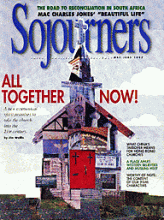Politicians running for office are addicted to money. Dollars pour through the veins of political campaigns in ever greater amounts. All this is a daily preoccupation for members of Congress, senators, and even presidents, as well as their opponents.
Like any addiction, more is always necessary to achieve
the needed higha small, overnight bump in the polls. Laws are stretched and loopholes are manipulated to feed the habit. Addictions always push one toward the edge of the law, and often beyond it. Restraint seems impossible, beyond ones control. Little wonder that "money laundering" is most frequent today in two arenas: illegal drug traffic and the financing of political campaigns.
Moneys corrosive effect on the nations politics occurs in three ways today. First, it diminishes fundamental democratic participation. The 1996 campaign, we are told, was financed by less than 1 percent of the populationlargely those with the substantial means to do so. To argue that such expenditures by the wealthy are a form of "freedom of speech" and part of what Trent Lott calls "the American way" assumes that spending is the same as speaking. It is not.
The Constitution is designed to create an equal playing field for political ideas and influence. Access to the political process in a healthy democracy should never be governed chiefly by money. Today it has become so through the insatiable appetite for campaign funds.
Read the Full Article
